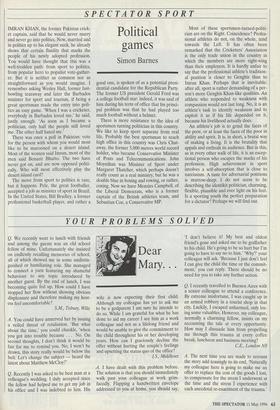SPECTATOR SPORT
Political games
Simon Barnes
IMRAN KHAN, the former Pakistan crick- et captain, said that he would never marry and never go into politics. Now, married and in politics up to his elegant neck, he already shows that certain fluidity that marks the people of his newly adopted profession. You would have thought that this was a well-trodden path: from sport to politics, from popular hero to populist vote-gather- er. But it is neither as common nor as straightforward as you would imagine. I remember asking Wesley Hall, former fast- bowling tearaway and later the Barbados minister for sport and tourism, if being a great sportsman made the entry into poli- tics an easy game. 'When I was a cricketer, everybody in Barbados loved me,' he said, justly enough. 'As soon as I became a politician, only half the people still loved me. The other half hated me.'
There was once a poll in Pakistan: vote for the person with whom you would most like to be marooned on a desert island. Most of the women said Imran, most of the men said Benazir Bhutto. The two have never got on, and are now opposed politi- cally. Who will most effectively play the desert island card?
The move from sport to politics is rare, but it happens. Pele, the great footballer, accepted a job as minister of sport in Brazil. In the United States, Bill Bradley, a former professional basketball player, and rather a good one, is spoken of as a potential presi- dential candidate for the Republican Party. The former US president Gerald Ford was a college football star: indeed, it was said of him during his term of office that his princi- pal problem was that he had played too much football without a helmet.
There is more resistance to the idea of sportsmen turning politician in this country. We like to keep sport separate from real life. Probably the best sportsman to reach high office in this country was Chris Chat- away, the former 5,000 metres world record holder, who became Conservative Minister of Posts and Telecommunications. John Moynihan was Minister of Sport under Margaret Thatcher, which perhaps doesn't really count as a real ministry, but he was a double blue in boxing and rowing, or rather, coxing. Now we have Menzies Campbell, of the Liberal Democrats, who is a former captain of the British athletics team, and Sebastian Coe, a Conservative MP. Most of these sportsmen-turned-politi- cian are on the Right. Coincidence? Profes- sional athletes do not, on the whole, tend towards the Left. It has often been remarked that the Cricketers' Association is the only trade union in the country in which the members are more right-wing than their employers. It is hardly unfair to say that the professional athlete's tradition- al position is closer to Genghis than to Imran Khan. Perhaps that is inevitable: after all, sport is rather demanding of a per- son's more Genghis Khan-like qualities. An athlete who responded to weakness with compassion would not last long. No, it is an athlete's task to identify weakness and to exploit it as if his life depended on it, because his livelihood actually does.
An athlete's job is to grind the faces of the poor, or at least the faces of the poor in ability and spirit. It is, in short, a brutal way of making a living. It is the brutality that appals and enthrals its audience. But in this, as in every other walk of life, it is an excep- tional person who escapes the marks of his profession. High achievement in sport involves a self-absorption that is close to narcissism. A taste for adversarial positions is marrow-deep. I do not seem to be describing the identikit politician, charming, flexible, plausible and ever light on his feet. Is a sporting youth the perfect preparation for a dictator? Perhaps we will find out.


































































 Previous page
Previous page